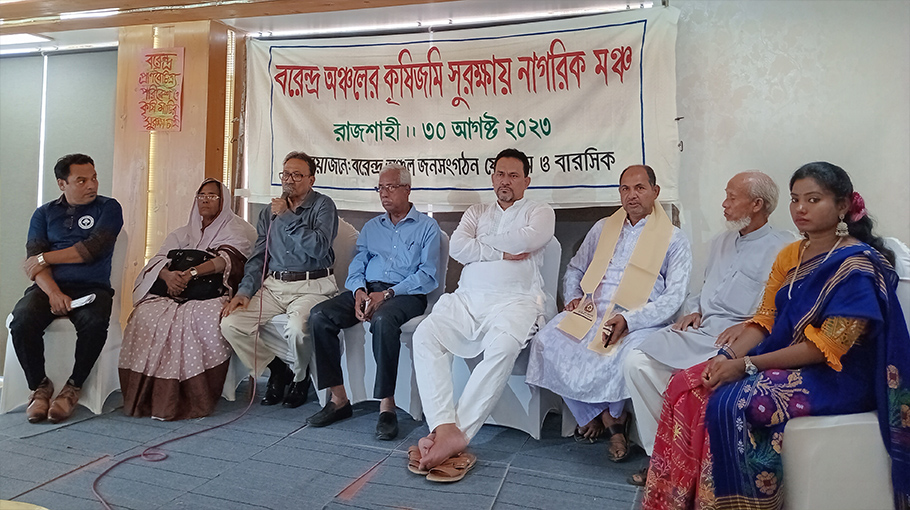Barind region turning into desert: 13 demands placed to save the region

With the slogan-'Headway to the heritage towards progress, the safe Barind land for all lives with the promising youths,' the Barind Youth Climate Conference was held with 150 young representatives from various districts of the Barind region at a convention centre in Rajshahi.
Barind Region Jonosanghathan Forum and the non-governmental organisation Bangladesh Resource Centre for Indigenous Knowledge organised the programme.
A 13 point-demand was placed at the conference to save the Barind region from an imminent climatic disaster.
The demands are: 'To declare the Barind region as a drought-prone area; to take effective measures in establishing water-righteousness during drought, extreme heat and water scarcity in the region; to enact a separate policy and rule to save the farmland of Barind region; stoppage of leasing the natural water-bodies to resolve the water crisis; to re-excavate the rivers, canals and the rivulets; to stop implementing residential projects on the farmland; to introduce 'drought allowance' for the Barind people; to involve youths of Barind region in Climate Fund Management and; to review and consider the traditional knowledge and the practices of adaptation by the indigenous people in combating the effects of climate change in a priority basis.
Moreover, the demands include: ensuring residential and civic facilities for the poor climate refugees and the slum dwellers of towns and cities; cooperating to flourish the depleting rural culture and arts due to the adverse impact of climate change; introducing special stipend and fellowship for the youths working and conducting research on the climate change issues; propagating more through the media the exemplary jobs by rural
communities working in combating climate change and to form a climate-friendly Media.
River and Environmental Researcher Mahbub Siddiqui at the conference said,' Now Barind region is envisioned as a vast, weird, dreary stretch of land. But the Barind region was not of its kind once upon a time. Even, some 200 years ago, the Barind region was filled with dense, inaccessible forest. It was a sanctuary for many wild animals and birds. Then the marauding people of the East India Company started to clear the forest to cultivate 'fine rice' in the region and ultimately all the forest of the Barid region vanished. With the depletion of the forest, the adverse impact of climate change was noticed in the Barind region. Nowadays, the Barind region is being turned into a desert by lifting underground water through thousands of deep tube wells. The lifting of underground water should immediately stop and the cropping pattern of the Barind region should be changed with the crops which require less irrigated water.'
The first phase of the discussion entitled, ' Citizen's platform for save farmland of Barind region' was also addressed, by Freedom Fighter Dr Abdul Mannan, self-educated Agro-scientist and Convener of Barind Region Jono Sanghatan Forum Nur Mohammad, trader Sekander Ali and farmer Rahima Begum.
Speakers expressed deep concern at the depleting environment and the underground water level running deep gradually due to excessive use of water for irrigation purposes. They mentioned the underground water level is now not available before 300 metres of depth and all the symptoms of a desert are now visible in the Barind region.
During the Second phase, Rajshahi Divisional Commissioner Dr Dewan Muhammad Humayun Kabir, Freedom Fighter Khandker Abul Hasan, Vice-Chancellor of North Bengal International University Dr Bidhan Chandra Das and Associate Professor of the Department of Anthropology of Rajshahi University Professor Avijit Roy.
Coordinator of BARCIK, Researcher Shahidul Islam conducted the function.




